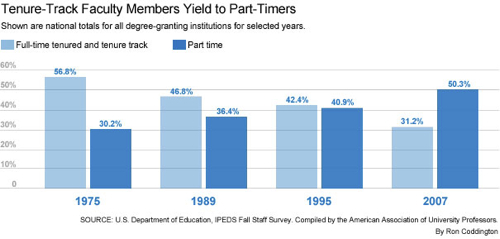
The above chart comes from a recent widely circulated article in the Chronicle of Higher Education entitled “Tenure, RIP: What the Vanishing Status Means for the Future of Education.” Similarly, the New York Times asked “What if College Tenure Dies?” on its Room for Debate blog. In response, Amardeep Singh asks whether the actual numbers are declining, or simply the proportion of tenured faculty – as a result of the rise of community colleges and for-profit institutions? Amardeep sees this as a reason for dismissing the whole thing as a “non-issue” for “most universities.” I’m not sure if he’s right – even if tenured positions are growing, one would presumably also have to show that the rate of growth isn’t being affected by the increased use of part-timers – but even if he is, I think the real question is the one Alexandre Enkerli asks on his blog: how do we think about the role of part-time teaching?
Whether or not tenure is on the decline, it is clear that part-time teaching is on the rise and Alexandre correctly argues that the debate about tenure detracts from what should be an important discussion about the position of part-timers within the university system. He provides some insight into the different ways part-timers are treated in different education systems (Canadians get higher compensation than Americans) and the different models of part-time teaching within the university:
Conversely, the “career part-timer” and the “drive-by teaching” models seem to me to be the results of an inefficient system. It also seems likely that both models could be replaced by a special form of long-term and renewable teaching-focused contract.
Marc Bousquet is someone who has long been focused on the issue of academic labor practices in his blog, How the University Works. In a recent post he took a recent AFT survey to task precisely for focusing “on part-time faculty to the exclusion of all the other major categories of non-track faculty, including full-time nontenurable, graduate students, post-docs, staff, etc” thus giving a distorted view of the system as a whole.
The story being reported out of the survey is the part that isn’t news: The roughly 1/4 of all faculty who are moonlighting and teaching a course or two for love are happy with a psychic wage. (”I teach at the u,” over golf or mah-jong, delivers status compensation with both friends and professional associates in one’s primary profession.)
Asking this question of these people is a a little bit like surveying folks in a burger joint and “discovering” that they eat meat. Of course those who are teaching avocationally are mostly satisfied with working part-time.
When read critically, the survey means something very different: It has discovered that roughly half of the people in the burger joint are actually vegetarians! And even quite a few of the meat eaters think the fare could be improved.
That’s the interesting result–that half of all part-timers are trying to get something that isn’t on the menu. And most of the scholarship suggests that we’d all be a lot healthier if what they wanted (full academic citizenship) was available to them.
Tenure and academic freedom are important, but any real discussion of higher education needs to look beyond issues of academic freedom and elite institutions and start looking at ways to improve the lives of the increasingly vast lumpenprofessoriate.
Not thirty minutes before I read this, I was plowing through Piven and Cloward’s Regulating the Poor and reading the bit about the growth of temporary workers. I immediately thought about this exact situation.
Here’s a study I’d like to see: how many jobs that are advertised as restricted, non-tenure track with the possibility of converting to tenure track actually convert non-tenure positions to tenured ones. I see this in ads all the time, but I know only one person who has successfully navigated such a transition. It was in the sciences and the person has a Ph.D from Harvard.
My hypothesis is that this is either a cynical move on the part of departments seeking to manipulate hires into busting their butts without any real intention of converting them to tenure track, or else it is a vestigial tail — a hold over from another era when such transitions were more likely.
@Matt: Talk of conversion to TT, at least for our department, usually just represents a collective wish (more so than anything grounded in reality) that the department will get another such line from the administration.
I think that language is code for “we’re trying to do a spousal hire but if someone else is accidentally hired we’d like a do-over”.
I think spousal hires are an urban legend. They only ever happen at R1’s flush with cash or when the spouse actually walks on water.